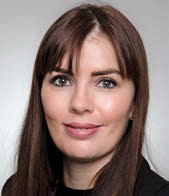HOW CAN beauty therapists AND MEDICS work better TOGETHER?
Experts Dr Sophie Shotter and Louise Tilden discuss the key problems facing medics and beauty therapists, and the steps we can take to resolve them
There has long been somewhat of a divide between beauty therapists and medical professionals. There are varying opinions about who should or shouldn’t be able to perform injectables, and on the flipside, some therapists have felt discredited when seeking advice from medics. So, how can we bridge the gap between the professions? Two successful business owners share their thoughts on the matter and how they propose beauty therapists and medical professionals can support one another. >
“ Set up a referral partnership with a medical professional”

Dr Sophie Shotter is medical director and founder of Illuminate Skin Clinic in Kent. She is also a member of the British College of Aesthetic Medicine
“I have worked closely with some excellent beauty therapists during my career in medical aesthetics. These relationships have been built on mutual respect for what the other brings to the table. As a doctor I have in-depth anatomy knowledge, extensive diagnostic skills and an ability to think laterally in an emergency. I am able to prescribe medication for treatment and also for complications and I can provide support and advice to nonmedical members of my team. The therapists I have worked with have a passion for skin, excellent interpersonal skills and provide a holistic touch, meaning our patients benefit from a 360-degree approach to their care.
“I have become increasingly concerned by the number of beauty therapists choosing to perform injectable treatments. My experienced medical colleagues and I still have a degree of anxiety every time we inject a face. That is despite my five years at medical school, six years of NHS work in anaesthetics and intensive care medicine, additional university degrees, six days a week of injecting experience, annual cadaveric workshops and more than 150 hours of CPD in aesthetics per year. It worries me that people are categorising injectables as a ‘beauty treatment’.
“An artistic eye is part of performing good treatments, but it is by no means all that counts. Every time I inject a patient, I’m injecting a substance that carries significant risks such as allergy, infection, vascular occlusion and blindness. As a doctor, I understand those risks, know how to minimise them and how to treat them should they happen. I’m able to carry and stock the emergency medications needed and issue prescriptions or patients as necessary.
“At my clinic, our therapists perform an important role in supporting my work and will often help me during complications work. Unfortunately, I do a lot of pro bono corrective work to help victims of ‘botched’ procedures, many of which have been performed by non-medics who haven’t been able to identify when there is a serious problem that needs addressing.
“I would urge us all to value and respect each other’s contributions to this industry, but to work together and within our own professional boundaries. If we can do this then we can deliver incredible results for patients by combining our different skill sets. Just as I’m not the best person to deliver a medical-grade facial, neither is a beauty therapist the best person to inject filler, in my opinion.
“If there is a procedure that would be better in the hands of my plastic surgical colleagues then I would refer it to them, and I would encourage any beauty therapists thinking of going down this path to instead set up a mutually beneficial referral partnership with a great medical professional near to them.”
”An artistic eye is part of performing good treatments, but it is by no means all that counts”
“ We need more support getting GP consent for treatments”

Louise Tilden is owner of The Garden Room salon in Taunton, where she has grown a loyal client base over the past six years
“I want to address the elephant in the room - the frustration beauty therapists face when trying to obtain GP consent so clients can have a treatment. When we train in beauty therapy, we have it drummed into us to seek a doctor’s consent for any medical condition that is a contradiction for treatment and to get assurance that it’s a suitable service for the customer to have.
“For example, ITEC-trained therapists are told type 1 diabetes, heart conditions, epilepsy, cancer, pregnancy and high blood pressure are all considered total contraindications to massage. I support the notion that we as beauty therapists are not medically trained and it is not our job to make clinical decisions. Not ever.
“However, it’s a battle sometimes getting cooperation from medical practitioners without our industry feeling discredited in the process. Let me give you an example. Locally, I’ve had one surgery point blank refuse my client a letter of consent, even if they paid for it, touting, ‘we don’t offer consent for beauty treatments’.
“How do we, as an industry, get through to medical professionals so they understand that we ask for consent to ensure the wellbeing of the client (aka their patient) and to ensure their suitability? Regardless of our personal thoughts on the matter, beauty therapists are not allowed to treat clients without the letter. Our hands are tied. However, I think GP surgeries that charge £30 per letter, when they could simply have a few generic standard letters on their system, are absolutely shocking.
“The resistance beauty therapists get from GPs means that clients usually cancel their booking because they don’t want to pay or are just fearful of asking. It’s surely for the best of the client’s wellbeing that they enjoy some me-time. Yet, others have experienced completely different reactions. I’ve had clients report that GPs have laughed and replied, ‘we’ve never been asked for a letter of consent before and how ridiculous, of course you can have a massage’.
”The battle is getting cooperation from medical practitioners without feeling discredited in the process”
“My best advice to other beauty therapists is take the time to read your policies and ask questions. It would be great if we could have the support of the medical profession once and for all. We should work together for the good of the client/patient. Perhaps the onus could be on us to develop relationships with the practice managers in our local GP surgeries as I genuinely believe they don’t understand the importance of the consent.
“Maybe it’s time for us to speak to the British Medical Association or local MPs to ask for their support, or maybe a committee within parliament could be formed to pass some clear legislation on the matter. Whatever the answer, let’s try and get the conversation started.”

Disclaimer: the thoughts and opinions expressed belong solely to the authors and are not the view of Professional Beauty or Trades Exhibitions Limited